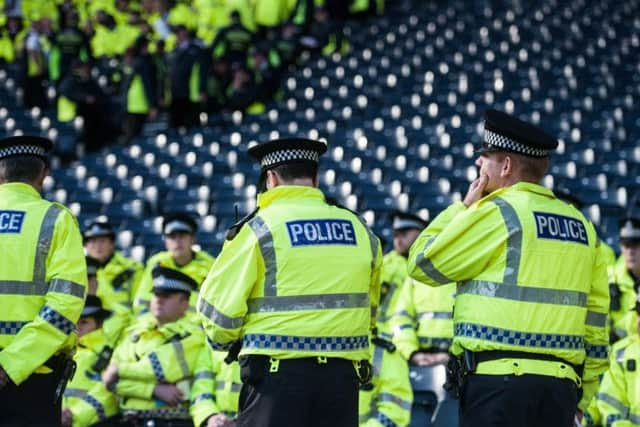Safety failings putting football fans at ‘significant risk’, report claims
The review of football policing found clubs deliberately selling more tickets than their stadium capacity, erecting unsafe terracing for away fans and safety certificates being sent through the post by local authorities without site visits being made.
The review was led by Deputy Chief Constable Mark Roberts, the National Police Chiefs’ Council’s lead for football policing.


Advertisement
Hide AdAdvertisement
Hide AdHe said fans were being let down by inadequate stewarding, citing one example where a steward who was part of safety cordon was seen to celebrate the home side’s goal.
His report said the demotion of Rangers after the club went into administration had “shone a spotlight” on safety practices in lower leagues, with a number of serious issues caused by large numbers of away fans attending smaller grounds.
He said issues such as deliberately selling more tickets than stadium capacity and tickets being sold for areas of the ground that did not exist or were inaccessible also extended to Scottish Cup matches.
He said: “Those type of examples clearly paint a picture where members of the public could be put at significant risk attending those events as a result of the lack of rigour in the safety framework and regime.”
Mr Roberts was commissioned to carry out his work by Police Scotland in October – a month after a crush outside Celtic Park which left a number of fans injured.
Supporters’ group Fans Against Criminalisation criticised the review for failing to investigate that incident.
Spokeswoman Jeanette Findlay said: “The whole way this review came about looks like an attempt to head off at the pass a genuine review. It’s not independent and it’s failed to look at Police Scotland’s own failings.
“Police Scotland views fans as criminals and potential sources of disorder and that’s a problem for us on an ongoing basis.
Advertisement
Hide AdAdvertisement
Hide Ad“We would like to see a proper parliamentary inquiry into how they police us and the culture within Police Scotland which has developed over the period of the Offensive Behaviour Act - it’s poisonous.”
Labour MSP James Kelly, who led the campaign to have the Offensive Behaviour Act scrapped, said: “Whilst it is welcome that Police Scotland rightly identify that they need to improve their relations with fans, this report appears to have brushed aside the widespread complaints from those same supporters.
“The anger that law-abiding fans feel over being overtly filmed has been dismissed as a public relations failure that needs communicated better instead of reviewing if it is a justified technique to use regularly despite the low level of criminality in football stadiums.
“It is matter of concern that six months after the crush at a Celtic v Rangers game, which left five fans injured, questions still remain about the crowd safety operation on that day.
“Police Scotland must do all it can to rebuild trust with fans which has been eroded in recent years.”
While his report did not address the issue of sectarianism, Mr Roberts said recent incidents in Scotland were in line with a 67 per cent rise in hate crimes at matches in England and Wales.
A former match commander with responsibility for Old Trafford, he acknowledged that while sectarianism was specific to the Scottish game, there is nevertheless a “toxicity” in high-profile English fixtures such as Manchester United v Liverpool.
But he said chants about Hillsborough or the Munich air disaster had become “culturally unacceptable” due to supporters shunning a minority who sing them.
Advertisement
Hide AdAdvertisement
Hide AdHe said: “I think people need to recognise that there is a problem (with sectarianism). The way you solve the problem is getting everyone bought into it and making a commitment that it needs to change.
“One of the heartening things we’ve seen in England, where we have started tackling some of the homophobia and racism, is a greater willingness of supporters themselves to come forward and give us statements and point out when people are misbehaving.
“All the responsibility shouldn’t fall on the police, it needs to be a joint effort.”
Detective Chief Constable Will Kerr, of Police Scotland, said: “This was a short, sharp review. The catalyst for it wasn’t the crush at Celtic Park, it just happened to be timed with that.
“It was more about how we take a look at ourselves as an organisation and see if there’s anything we could do differently or improve.”
On the issue of sectarianism, he said: “There’s no easy answer, no magic bullet to get rid of sectarianism overnight.
“This needs to be a thoughful, mature, joined-up conversation from all the people involved on how to change the tone so it becomes unacceptable.”
David Hamilton, vice chair of the Scottish Police Federation, said: “We concur with DCC Roberts that Scottish football has a hooliganism problem as well as a sectarian problem.
Advertisement
Hide AdAdvertisement
Hide Ad“They are both manifestations of the same peculiarity – that some supporter groups believe that criminal behaviour is acceptable at football matches.
“Fans Against Criminalisation’s refusal to even engage with the review has shown themselves to simply be apologists for this criminality. They have refused the opportunity to engage with the review, maintain their entrenched opinions and clearly have no interest in acknowledging yet alone fixing the problems of the Scottish game.
“They have no legitimacy and until they change their approach, need to be sidelined while we engage with real fans.”
